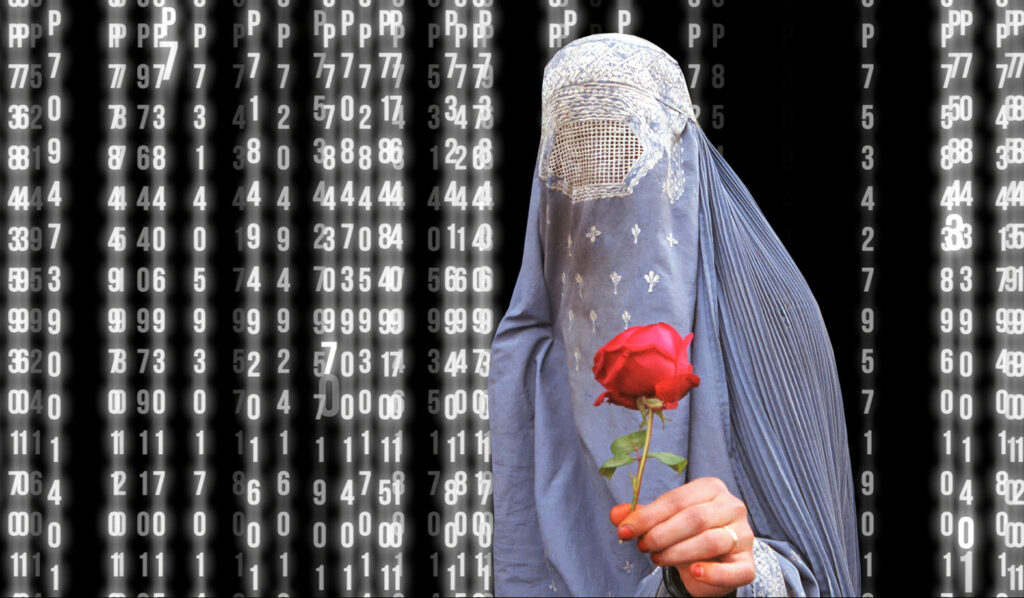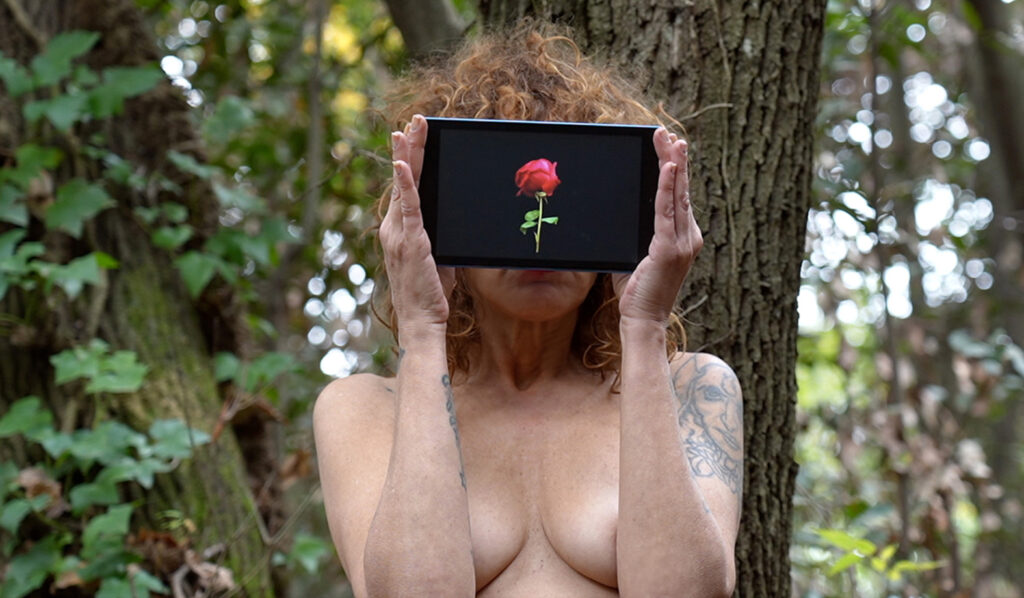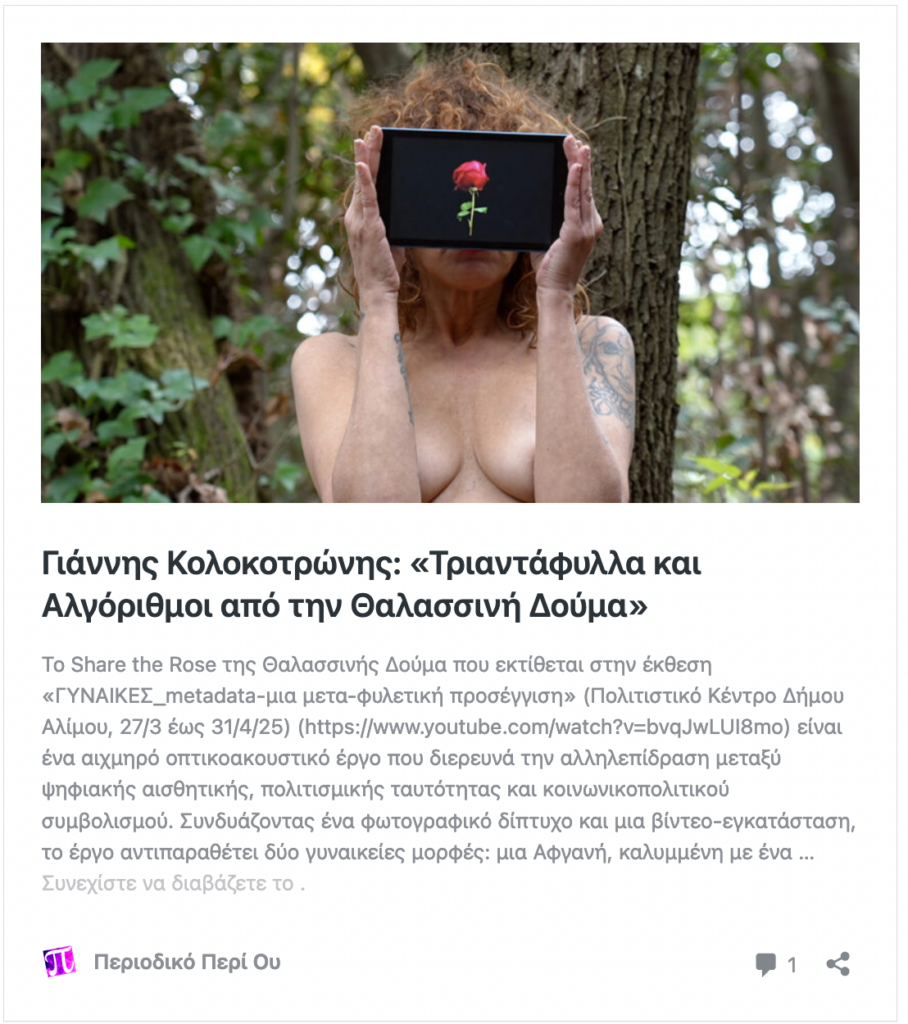WOMEN Metadata_A Post-Gender Approach, Cultural Center of Municipality of Alimos, March 27th – April 30th, 2025
”Share the Rose” by Thalassini Douma is a video art created for the group exhibition ”WOMEN Metadata_A Post-Gender Approach”, held at the Cultural Center of the Municipality of Alimos (96 Ionias Ave.), Athens, Greece. Curated by Yannis Kolokotronis, Professor of History and Theory of Western Art at the Department of Architectural Engineering, Democritus University of Thrace.
Exhibition duration: March 27 – April 30, 2025
Performer: Francesca Perti
Created by Thalassini Douma ©2025 – All rights reserved.


“Share the Rose” by Thalassini Douma, exhibited in the show “WOMEN_metadata – a post-gender approach” (Cultural Center of the Municipality of Alimos, 27/3 – 31/4/25), is a powerful audiovisual work that explores the interaction between digital aesthetics, cultural identity, and sociopolitical symbolism.
Through a photographic diptych and a video installation, the work juxtaposes two female figures: an Afghan woman, veiled in blue, holding a red rose against a backdrop of algorithmic code, and a Western woman, naked in nature, hiding her face behind a digital screen that projects the image of the rose.
This contrast creates a compelling visual and poetic metaphor of the intersection between tradition and technology, reality and simulation, visibility and invisibility, and above all, the struggle for women’s political and individual rights.
Douma’s composition bridges geographical and cultural divides, constructing a Baudrillard-style hyperreality where different social experiences coexist and are mediated by complex structures of representation and control.
The rose—a universal symbol of beauty, love, and resistance—is the connecting thread between the two women, a visual and symbolic reference both delicate and thorny, highlighting the isolation and asymmetrical nature of their lived experiences.
In the era of digital mediation, where identity is a constantly shifting narrative of surveillance and construction, the rose becomes a gesture, an image, an act, and a simulation.
The two female figures—one veiled, the other entirely nude—exist within systems that regulate visibility: the former through imposed anonymity, the latter through unapologetic nudity reconnected to Mother Nature.
This contrast reveals how femininity is shaped by sociopolitical conditions and digital infrastructures, in line with Judith Butler’s theory (Gender Trouble: Feminism and the Subversion of Identity, Routledge, 1990).
The visual language of Share the Rose by Thalassini Douma addresses themes of authenticity, surveillance, and the construction of femininity, evoking the works of Shirin Neshat (Women of Allah series, 1993–1997), focused on gaze and veiling; Hito Steyerl (How Not to Be Seen: A Fucking Didactic Educational .MOV File, 2013), which dissects the role of screens in visibility and invisibility; and Zanele Muholi (Faces and Phases, 2006), which explores the Black queer experience.
Share the Rose by Thalassini Douma is not a mere binary opposition between East and West, tradition and contemporaneity.
It reveals how contemporary women’s identities are shaped in hybrid spaces where networks of control, expectation, and technology interact.
Her approach is as poetic as it is critical, and her answer is clear: in the age of simulation, beauty and resistance persist in the simple, human act of sharing.
Yannis Kolokotronis
Professor of Art History and Theory
Department of Architectural Engineering
On line publication
Από τον Καθηγητή Ιστορίας και Θεωρίας της Τέχνης Γιάννη Κολοκοτρώνη στο περιοδικό Λόγου και Τέχνης “Περί ου”

Leave a comment